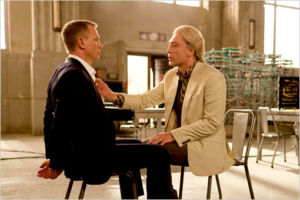It felt four score and seven years long.
 I like Abraham Lincoln: Vampire Hunter a lot more.
I like Abraham Lincoln: Vampire Hunter a lot more.
The last time Stephen Spielberg and Tony Kushner collaborated was Munich, the taut, emotionally devastating thriller about the Israeli agents who hunted down the perpetrators of the kidnapping and massacre of Israeli Olympians in 1972. So, I had high hopes for their latest. Lincoln stars Daniel Day-Lewis as the 16th president, Sally Field as Mary Todd and Tommy Lee Jones as the abolitionist senator, Thaddeus Stevens. Unfortunately, instead of making apolitical thriller or a war movie, Kushner and Spielberg have given us an over-long, turgid lesson in Congressional politics and facile morality. The main plot of the film is Lincoln’s wrangling for the passage of the 13th Amendment – to end slavery. Day-Lewis does Lincoln better than anyone ever has, but the whole movie is a dirge. At least the absurdist Abraham Lincoln: Vampire Hunter imagined an audience and tried to entertain it.



